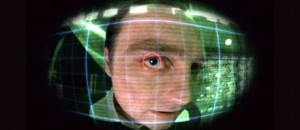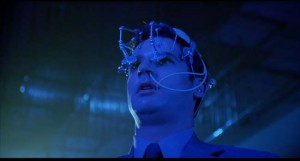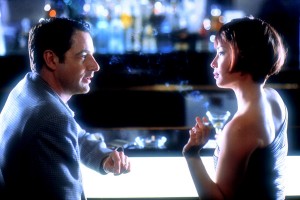Cypher
 Miramax has a tendency to produce medium budget sci-fi and horror films and right before they are about to be released, they put them back in the vault for six months, so all of the momentum disappears, and then dump them into a few hundred theaters, with no promotion behind it. Recently this has happened with Imposter, Equilibrium, They, Below, and Cypher. It’s a nice little way to blame the filmmakers for the lack of success, or claim that the film was barely good enough to play in theaters. The first four listed have had a far larger life on DVD and video, but Cypher has seen exactly no release in the US whatsoever, no theatrical, DVD, or VHS (I watched a region 2 Japanese disc), a disappointment seeing as director Vincent Natali had previously made the tense and creepy cult hit Cube, which may have appeared to be an episode of Star Trek gone Canadian, but felt more organic than that.
Miramax has a tendency to produce medium budget sci-fi and horror films and right before they are about to be released, they put them back in the vault for six months, so all of the momentum disappears, and then dump them into a few hundred theaters, with no promotion behind it. Recently this has happened with Imposter, Equilibrium, They, Below, and Cypher. It’s a nice little way to blame the filmmakers for the lack of success, or claim that the film was barely good enough to play in theaters. The first four listed have had a far larger life on DVD and video, but Cypher has seen exactly no release in the US whatsoever, no theatrical, DVD, or VHS (I watched a region 2 Japanese disc), a disappointment seeing as director Vincent Natali had previously made the tense and creepy cult hit Cube, which may have appeared to be an episode of Star Trek gone Canadian, but felt more organic than that.
 Cypher (also known as Company Man, which is a less distinctive, but more appropriate title), is shot in the same way that Cube was, everything has the extremely clean and antiseptic look of sci-fi, fish eyed lenses, an Alphaville hairdo, among other things, but Cypher is not really a sci-fi film. Opening with Jeremy Northam, with a shoddy American accent, playing Morgan Sullivan, dressed in thick glasses and snorting virtually every other line, being asked questions during an abnormal job interview, the movie is at first more of a comedy of repetitive business travel than anything else. He is being hired by Digicorp to pretend to be Jack Thursby, telling no one what he is doing, not even his wife, and go to business conventions of their largest competitor and spy on them through a microphone in his suit jacket pocket. The conventions appear to be monotonous, dull, and seemingly unimportant to Sullivan, but his job is not to analyze, just to sit there and record. During his stay in a hotel, he sees Lucy Liu with a hideous red wig, getting some ice at the ice machine. He spots her again at the bar, and this is where the movie is at its best, as Sullivan is forced to decide who he is as he attempts to hit on her, and this begins his de-nerdification process (think Paul Rudd in The Shape of Things). The scene is funny and suspenseful, he’s not sure why he’s hitting on her as he has a wife at home, but he’s trying to play the Thursby part and understand the character, but his Sullivanisms still linger. From that point on the movie becomes a mind-fuck movie, sort of like The Game, as allegiances are changed usually twice within the same scene, and Sullivan/Thursby is never sure exactly whose team he is playing for, what they want from him, what identity he is supposed to be, and why everyone threatens to kill him.
Cypher (also known as Company Man, which is a less distinctive, but more appropriate title), is shot in the same way that Cube was, everything has the extremely clean and antiseptic look of sci-fi, fish eyed lenses, an Alphaville hairdo, among other things, but Cypher is not really a sci-fi film. Opening with Jeremy Northam, with a shoddy American accent, playing Morgan Sullivan, dressed in thick glasses and snorting virtually every other line, being asked questions during an abnormal job interview, the movie is at first more of a comedy of repetitive business travel than anything else. He is being hired by Digicorp to pretend to be Jack Thursby, telling no one what he is doing, not even his wife, and go to business conventions of their largest competitor and spy on them through a microphone in his suit jacket pocket. The conventions appear to be monotonous, dull, and seemingly unimportant to Sullivan, but his job is not to analyze, just to sit there and record. During his stay in a hotel, he sees Lucy Liu with a hideous red wig, getting some ice at the ice machine. He spots her again at the bar, and this is where the movie is at its best, as Sullivan is forced to decide who he is as he attempts to hit on her, and this begins his de-nerdification process (think Paul Rudd in The Shape of Things). The scene is funny and suspenseful, he’s not sure why he’s hitting on her as he has a wife at home, but he’s trying to play the Thursby part and understand the character, but his Sullivanisms still linger. From that point on the movie becomes a mind-fuck movie, sort of like The Game, as allegiances are changed usually twice within the same scene, and Sullivan/Thursby is never sure exactly whose team he is playing for, what they want from him, what identity he is supposed to be, and why everyone threatens to kill him.
And of course, this is also the exact moment where the film becomes less interesting, and follows obvious formula. It turns into a mix of Total Recall, The Usual Suspects (including a character named Finster), and but mostly the aforementioned The Game without the emotional resonance of the conclusion nor the puzzle wit of the rest of Fincher’s masterpiece. Natali does best when he concentrates on the confusion of the scenario. There is a lot of humor in the thought of Northam realizing the silliness of his predicament. At one point he is instructed to lie to his fake wife about his fake business trip, a business trip she knows is fake, and he knows she knows it. Another scene has him being handed a briefcase with a mic in a salt shaker, a camera in a ceramic dog, among other objects, and he almost laughs at the silliness of the espionage while others seem to take things so seriously. But other times, there is so much focus on the “cleverness” of the twists, when they don’t mean anything to the audience, since it happens so frequently, and doesn’t change Sullivan/Thursby’s understanding of the situation or ours. Natali should have stuck with the humor angle, playing up the angle that if someone Northam is asked if he’s a double agent, he wouldn’t even know the answer.
 Now that Natali has a larger budget ($10 million vs. the $250,000 of Cube), he decided to go with more elaborate special effects, sometimes effectively, like with a gorgeous CGI helicopter that is sleek and stealth, to the totally unnecessary underground station, filled with level after level of multi-colored room and features something that should have been put to death after Airplane II, a huge triptych device that seems to nothing other than bleep and blip and flash its lights. These things serve more as a distraction, like Natali felt like he might as well spend the money on something, and so he chose to elaborate on the exaggerated geometric shapes he explored in Cube, as many shots seem to be trying to recreate that feeling.
Now that Natali has a larger budget ($10 million vs. the $250,000 of Cube), he decided to go with more elaborate special effects, sometimes effectively, like with a gorgeous CGI helicopter that is sleek and stealth, to the totally unnecessary underground station, filled with level after level of multi-colored room and features something that should have been put to death after Airplane II, a huge triptych device that seems to nothing other than bleep and blip and flash its lights. These things serve more as a distraction, like Natali felt like he might as well spend the money on something, and so he chose to elaborate on the exaggerated geometric shapes he explored in Cube, as many shots seem to be trying to recreate that feeling.
It’s a shame that the movie goes into retread territory because a lot of sequences are truly surprising. There is one brilliant and frightening scene where Northam attends one of the conventions, and is told, whatever happens, just to act normal, and this wild portion (though it is essentially meaningless within the film) makes you rethink exactly how dull and monotonous these conventions are. But the rest of the time, the machinery of the script takes over. Liu’s role is so thankless that literally every line she has is exposition, and it seems an exhaustive requirement for her to do so, as the story keeps changing over and over. Northam’s performance is more interesting because he is basically an actor playing an actor, and his character’s confusion may be close to his own in real life. The ending buries the entire film as it paints itself into a corner and unfortunately takes the eye-rollingly obvious way out, and once we learn what the entire point of the film was, you realize that that was an awfully convoluted way to go about doing something so simple, at far higher a risk than was needed.



